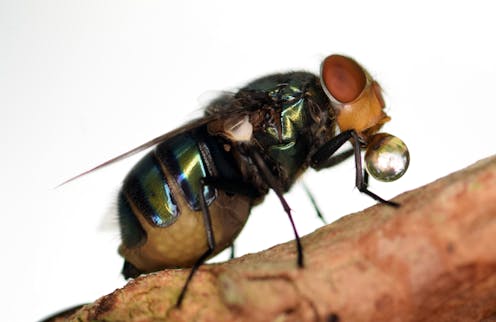Do flies really throw up on your food when they land on it?
- Written by Ravindra Palavalli-Nettimi, Postdoctoral Research Associate, Florida International University

Did you know flies can taste food without their mouths? As soon as they land, they use receptors on their feet to decide whether they’re on something nutritious. You may have noticed a fly rubbing its legs together, like a hungry customer getting ready to devour a meal. This is called grooming[12] – the fly is essentially cleaning itself, and may also clean the taste sensors[13] on the bristles and fine hair of its feet[14], to get a better idea of what is in the food it has landed on.
Should you trash food a fly’s landed on?
When a fly touches down on your sandwich, that’s probably not the only thing it’s landed on that day. Flies often sit on gross stuff, like a dumpster or decomposing food, that’s full of microbes. The germs can hitch a ride and, if the fly stays put long enough, hop onto your meal. This is much more dangerous than their saliva because some of the microbes[15] can cause diseases, like cholera[16] and typhoid[17]. But if the fly doesn’t stay longer than a few seconds the chances of microbes transferring are low[18], and your food is probably fine.
To keep insects from landing on your food, you should always cover it. If your house is infested with flies, you can use simple traps[19] to get rid of them. Carnivorous plants can also eat the flies and help control their population.
Are flies good for anything?
Spitting on food and spreading diseases sounds disgusting, but flies aren’t all bad.
Watch closely the next time you’re outside and you might be surprised by how many flies visit flowers to get nectar. They’re an important group of pollinators[20], and many plants need flies to help them reproduce[21].
Flies are also a good source of food for frogs, lizards, spiders and birds, so they’re a valuable part of the ecosystem[22].
Some flies have medical uses[24], too. For example, doctors use blow fly maggots – the young, immature form of flies – to remove decomposing tissue in wounds. The maggots release antiviral and antimicrobial juices, and these have helped scientists create new treatments for infections.
More importantly, the fruit flies you may have seen flying around ripe bananas in your kitchen have been invaluable in biological research[25]. Biomedical scientists from all over the world study fruit flies to find causes and cures for diseases and genetic disorders[26]. And in our lab[27], we study what the world looks like to insects, and how they use their vision to fly. This knowledge can inspire engineers to build better robots.
So, although it’s a nuisance to shoo flies away from your sandwich, maybe you can spare a few bits of your lunch?
Hello, curious kids! Do you have a question you’d like an expert to answer? Ask an adult to send your question to CuriousKidsUS@theconversation.com[28]. Please tell us your name, age and the city where you live.
And since curiosity has no age limit – adults, let us know what you’re wondering, too. We won’t be able to answer every question, but we will do our best.
References
- ^ Curious Kids (theconversation.com)
- ^ curiouskidsus@theconversation.com (theconversation.com)
- ^ compound eyes (askentomologists.com)
- ^ spitting on yours (doi.org)
- ^ over 110,000 (www.si.edu)
- ^ have no teeth (doi.org)
- ^ liquid diet (doi.org)
- ^ some water has evaporated (doi.org)
- ^ amylase (1md.org)
- ^ bread gets sweeter (doi.org)
- ^ CC BY-ND (creativecommons.org)
- ^ This is called grooming (doi.org)
- ^ taste sensors (doi.org)
- ^ bristles and fine hair of its feet (doi.org)
- ^ some of the microbes (doi.org)
- ^ cholera (doi.org)
- ^ typhoid (doi.org)
- ^ chances of microbes transferring are low (theconversation.com)
- ^ simple traps (theconversation.com)
- ^ pollinators (doi.org)
- ^ help them reproduce (theconversation.com)
- ^ part of the ecosystem (doi.org)
- ^ Norbert Försterling/picture alliance via Getty Images (www.gettyimages.com)
- ^ flies have medical uses (doi.org)
- ^ invaluable in biological research (theconversation.com)
- ^ causes and cures for diseases and genetic disorders (doi.org)
- ^ our lab (faculty.fiu.edu)
- ^ CuriousKidsUS@theconversation.com (theconversation.com)
Authors: Ravindra Palavalli-Nettimi, Postdoctoral Research Associate, Florida International University
Read more https://theconversation.com/do-flies-really-throw-up-on-your-food-when-they-land-on-it-168549

